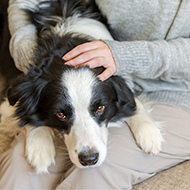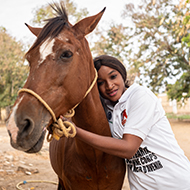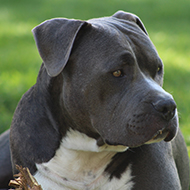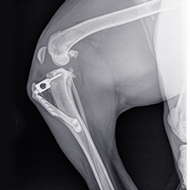Mitsy (left) and Molly with Sue's daughter Katie.
Alert follows near-fatal case at PDSA PetCheck event
Dog owners are being alerted to the signs of tracheal collapse following a near-fatal case at a PDSA event in Sunderland.
Owner Sue Richardson had taken her two dogs Molly and Mitsy to PetCheck - an event run by the PDSA which provides free wellbeing MOTs and microchipping for dogs.
While waiting for her appointment, Sue took her dogs for a short walk. Suddenly, Mitsy started suffering severe breathing difficulties, so Sue took her straight back to the PetCheck vehicle.
PDSA Vet Nurse Tina Scrafton, who was on the PetCheck vehicle at the time, said: “I was alerted to a dog in distress outside and went straight out to take a look. It was immediately clear how serious Mitsy’s situation was – she couldn’t breathe and her tongue was turning blue.”
Mitsy was rushed straight to emergency care at a nearby veterinary practice, where she was diagnosed with tracheal collapse - a condition where the airway closes in on itself. "It was 50/50 as to whether she would survive. I was heartbroken," says Sue.
Thankfully after just a few hours of treatment, Mitsy was able to go home and has made a full recovery. Now, Sue wants to do all she can to make other owners aware of what to do if this ever happens to their dogs.
PDSA nurse Tina advises: “Tracheal collapse isn’t seen very frequently, but it is more prevalent in small ‘toy’ breeds of dog, particularly as they get older. It is caused by weaknesses or defects in the cartilage that holds the windpipe open. Hot weather can exacerbate the condition, which is what brought about Mitsy’s sudden attack.
“It’s important for owners to be aware of the signs of tracheal collapse, which include a severe “honking” cough and difficulty exercising. In extreme cases the airway can collapse completely causing the brain to be starved of oxygen, which is why Mitsy’s tongue was turning blue. If your dog is showing any of these symptoms, contact your vet straight away.”
PDSA's PetCheck tours the UK every year between March and October. For more information visit www.pdsa.org.uk/petcheck.
Image (C) PDSA







 Birmingham Dogs Home has issued an urgent winter appeal as it faces more challenges over the Christmas period.
Birmingham Dogs Home has issued an urgent winter appeal as it faces more challenges over the Christmas period.
